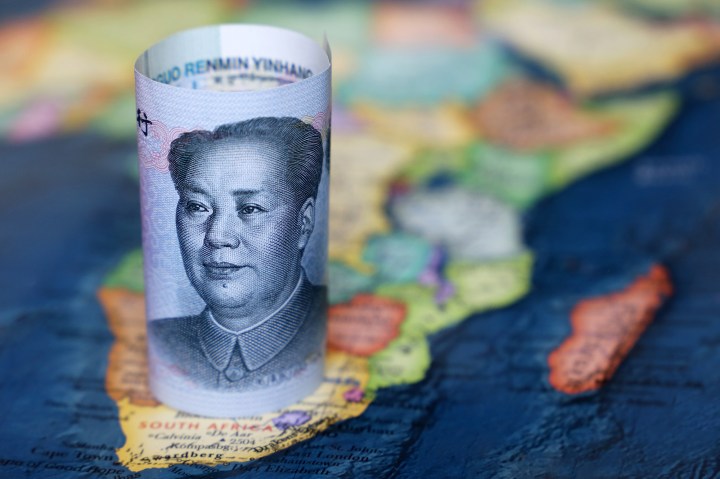BUSINESS REFLECTION
After the Bell: Tiger Tiger, burning less bright – what China’s economic problems mean for SA

The Chinese government has inadvertently inflated political uncertainty with successive and seemingly arbitrary attacks on prominent businesspeople.
I don’t know a huge amount about China; I have been to the Forbidden City and the Summer Palace (gorgeous, BTW) and I have stood on the Great Wall, a crucial rite of passage for all China hands.
But one thing I do know about China is that, if you intend to write about it, you have to begin with an ancient Chinese proverb. It’s just the first law for Westerners pretending to know more than they do about one of the most complicated and ancient civilisations out there.
So my proverb is, “Ch’i ’hu nan hsia pei”, or to put it another way, “He who rides a tiger is afraid to dismount.”
The phrase, like so many other Chinese proverbs, has layers of meaning. Most dictionaries interpret this as meaning that once a dangerous or troublesome venture is begun, the safest course is to carry it through to the end.
But the phrase has other meanings too and, actually, South African history has a different application of the phrase.
When I was at university, it came up quite often in reference to political analyses of the SA situation. In the late apartheid period, there was a lot of thought about how the country would change, particularly around why it wasn’t changing fast enough.
Almost through the entire 1980s, the single, overwhelming issue for all players along the political spectrum in SA was how political change would manifest. The reason was simple: everybody knew that staying as we were was not an option. One piece of analysis I remember about the situation even carried the title of the tiger analogy.
From the point of view of the ruling National Party, the Chinese proverb had a particular significance.
It wasn’t so much about continuing the difficult path, but was more about describing the difficulty of achieving change: if you happen to find yourself riding the tiger, how do you dismount without being eaten?
Personally, I think this insight was key to the decision of then president FW de Klerk to jolt the entire political system with a sudden unbanning of all previously banned parties and the release of political prisoners.
His solution to the problem of how to get off the tiger without being eaten was to do it fast and suddenly. Good strategy, when you think about it.
So, my preferred interpretation of the proverb is different from the usual one: rather than an exhortation to stay on the path, the proverb helps to illustrate why the riders of tigers seldom decide to stray from the given path.
The reason is simple: dismounting is dangerous.
And it’s particularly apt for authoritarian and totalitarian regimes because, without a built-in mechanism for political change, it’s hard for them to safely achieve a dismount.
This matters, of course, for the world, but also SA, since we have become very dependent on Chinese trade.
For years, trade between SA and China was a mutually beneficial win-win; SA exported natural resources and China manufactured stuff and sold it back to us. But as so often happens to countries that linger too long in the natural resources space, eventually the manufacturing countries gain the upper hand.
And so it has been here. Trade with China is about $30-billion a year – a third of that is constituted by exports to China and two-thirds by imports from China. In other words, the scales have now tipped massively in China’s favour.
But it’s not the end of the world because, overall, SA has had a trade surplus with the world as a whole, and has had one for about five years. Before that, it bounced around a bit.
However, there is an issue. SA has a trade surplus partly because commodity prices have been high, and the reason they have been high is because of strong demand from Asia in general, and China in particular. Yet, if you look at SA’s trade surplus, it’s slipping – as are most mineral commodity prices. The copper price, for example, is now about $3.6/pound, which is substantially less than the $5/pound it hit during most of 2021.
China’s economic problems are beginning to affect not just the developed world, but, indirectly, the developing world too.
Earlier this year, there were all kinds of questions about when China would drop its stringent Covid rules. When it did, the expectation was that China would bounce back. It didn’t.
Just this week it was announced that China’s economy edged back into deflation last month – such an extraordinary contrast with the rest of the world, BTW.
Deflation usually happens when demand dries up, and this is where the tiger comes in. Chinese economists are very worried about something called a balance sheet recession. This arises when people feel uncomfortable with their personal balance sheets, and they start paying down debt.
Individually, that is fine, but if everybody decides to do it at the same time, you can very quickly find yourself in a deflationary spiral.
Typically, balance sheet recessions happen after a bubble has burst, particularly in the property sector, and it’s obvious that this has happened very powerfully in China.
A deflationary spiral is always exacerbated by political uncertainty because it encourages a bias towards conservative spending.
The current Chinese government has inadvertently inflated political uncertainty with successive and seemingly arbitrary attacks on prominent businesspeople.
Only last week, Chinese authorities launched tax and land-use investigations into Foxconn, the world’s largest contract electronics maker. This is only the latest in a long string of these left-field, politically oriented, very public “investigations” into prominent entrepreneurs.
Chinese authorities may see the light and adjust course. They have done so plenty of times in the past. But it’s equally possible that they won’t – and then the “how do you dismount from the tiger” ride could get really bumpy. DM
















But the Great Unwashed believe China is the savior!!!
The drop in Chinese consumer confidence is only a very small part of the current malaise. It’s true that consumer confidence has taken a hammering from the economic disruption caused by the Zero Covid policy (small businesses bankrupted, job losses) and from the slowly imploding property bubble. It’s just that consumer confidence is not that big a driver of the Chinese economy – saving rates have been extraordinarily high for decades and consumption as a percentage of GDP is under 40%, way below most other countries.
Growth in China has been driven by investment – fueled by the juicy savings of the Chinese people and by debt. The government loosed a flood of investment in response to the 2008 Global Financial Crisis and spent recklessly on infrastructure projects (with diminishing returns on investment) and in building the production capacity of its many SOEs. So much production capacity, in fact, that it was massively overbuilt. The Belt and Road Initiative was designed to export that excess production capacity to save Chinese firms from their excessive investment woes. It has wound up being a debt hole for participating countries.
The political attacks on enrepreneurs are only a superficial reason for the malaise. They were always going to come because the Chinese Communist Party cannot tolerate an independent locus of power and an enemy is needed to redirect the anger of the people about the absolutely appalling mismanagement of the economy over decades.
I should add that the deflation we’re seeing in China is not driven by weak demand from Chinese consumers. It’s being driven by a fall-off in export orders from their primary markets – the US and Europe – and businesses attempting to redirect that vast, surplus manufacturing capacity to local consumers. Deflation in China is currently driven by the supply side. They make more stuff than they can sell.
This seems to be the obvious reason.